
Sad about Pitchfork? Try one of these classic collections of music writing.
On waking last Friday to news that somewhere, some poets were being tortured, I spent some time trawling through album reviews. Music criticism has always fascinated me. On the one hand, there is something ineffable baked into the enterprise. (I get why some have compared music writing to dancing about architecture.) On the other, consider the singular literary form. A good critique can be a passionate beast, blending essay and poetry and off-the-cuff musing. A great critique can point you to a future favorite, or simply be fun to read on its own.
Such waxing got me sad all over again about the recent news that Pitchfork, our best hub for music reviews, is on the outs. And while iShaad D’Souza assessed the “muted aesthetic,” of Taylor Swift’s eleventh studio album—I’m steeling myself for the coda. If you’re also the sort of person who will miss obsessive review culture if and when it goes, consider self-soothing with one of these classic collections.
*
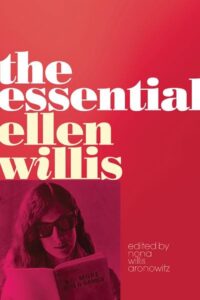
Ellen Willis, The Essential Ellen Willis
Ellen Willis, the irreplaceable Village Voice rock and culture critic, is simply one of the best to ever do it. And this compendium from the radical public intellectual and self-described “irrepressible crank” is extra-exciting because it places her (singular) reviews alongside her (brilliant) political essays. In these pages, you’ll find a genius grappling with The Velvet Underground and Janis Joplin—but also, “the mass psychology of terrorism.” So if you’re a student of pop culture’s many facets, this doorstop is for you.
But as I recognize it’s sort of cheating to place her “essential,” works on this list, fans specifically hungry for Willis’ music criticism might fare better with her meaty, impactful collection, Out of the Vinyl Deeps.
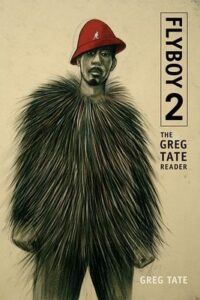
Greg Tate, Flyboy 2: The Greg Tate Reader
I’ve got Greg Tate top of mind this week. Let that stand as testament to the late critic’s piercing, poetic, and ever-witty style. His ur-collection Flyboy in the Buttermilk is a little hard to find these days, but luckily fans can bask in this 2016 reader. Flyboy 2 features plenty of Tate’s “signature mix of vernacular poetics and cultural theory.” Stay for scintillating reviews of Azealia Banks’ mixtape, and deep dives into “the ties between Afro-futurism, Black feminism, and social movements.”

Hanif Abdurraqib, A Little Devil in America
Honestly Hanif Abdurraqib’s entire canon of nuanced music writing is worth your time. (I’m especially partial to Go Ahead in the Rain: Notes to a Tribe Called Quest.) But I send up A Little Devil… today because it’s one of few critical collections I can think of that specifically explores praise. This expansive, freewheeling book includes love letters to Patti LaBelle, the Wu-Tang Clan, and Billy Dee Williams, among other Black artists. And I can personally attest that it’s a cozy Sunday companion.
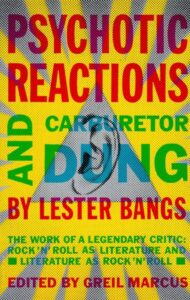
Lester Bangs, Psychotic Reactions and Carburetor Dung
The Philip Seymour Hoffman interpretation of Bangs lives rent-free in my brain. But the charmster Cameron Crowe committed to film in 2000’s Almost Famous doesn’t entirely capture the linguistic pyrotechnics of the mad king himself. Reading Bangs is a bit like watching fireworks: phrases erupt, and you’ll see strange colors. Amanda Petrusich of The New Yorker concurred in better words, calling him “one of the most important critical writers of the last hundred years.” She went on to note, of this collection:
Bangs’s prose is loose and musical; each sentence attempts, in one way or another, to approximate its subject, to inhabit and express a particular rhythm, a beat. To read him is to behold someone trying, desperately, to get closer to something he cherishes, to hold it down long enough to marvel at it and love it more deeply.
What could be more (un)cool?
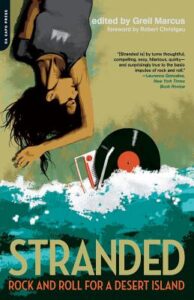
Edited by Greil Marcus, Stranded: Rock and Roll for a Desert Island
This anthology, edited by renowned rock critic Greil Marcus, features essays from a pantheon of music journalist greats, some of whom are mentioned in their own right on this very list. Per the title, every piece is a response to the old cocktail party question, what-would-you-take-to-a-desert-island (assuming electricity, a record player, et cetera). The result is a series of salutes to everyone from Captain Beefheart to Little Willie John. This one’s a great primer, for the critic-curious.
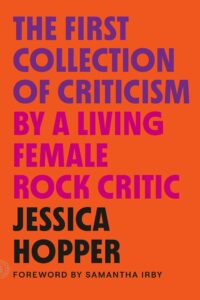
Jessica Hopper, The First Collection of Criticism by a Living Female Rock Critic
This career-spanning collection lives up to its audacious title. Hopper’s notes on everyone from R. Kelly to Cocteau Twins are punky, canny, and doggedly feminist, infused with a fan’s devotion. But her eye is unsparing. She wants the best from her faves. Bonus points for this read considering Hopper is a senior editor at Pitchfork. You can still find her byline there, going frank and deep on Big Star, Peaches, and Lana del Ray.
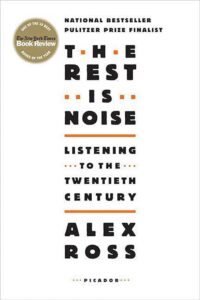
Alex Ross, The Rest is Noise: Listening to the Twentieth Century
Ross has been writing about noise over at The New Yorker since 1996. Given his seasoned culture vulture status, maybe it’s no surprise that this ambitious book attempts to summarize the music of, yes, you read correctly, an entire century. The twist is that he seems to have succeeded. Nicholas Lezard at The Guardian praised this sweeping book for its “miraculous” ability to capture big picture trends and anecdotes alike. According to Lezard, Ross accomplishes “the remarkable trick of making what may be considered abstruse musical matters widely accessible.”
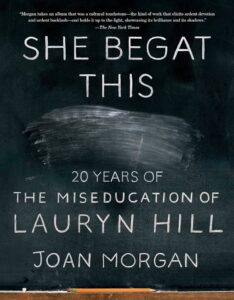
Joan Morgan, She Begat This: 20 Years of the Miseducation of Lauryn Hill
The author Joan Morgan originated the term “hip-hop feminism,” while wrestling with a beloved art form in her 1999 memoir/manifesto, When Chickenheads Come Home to Roost. In She Begat This…, Morgan applies that same loving but implacable gaze to a single artist. Praised for its fluid and candid style, this slim ode/critique encounters the many sides of Ms. Lauryn Hill, and situates “The Miseducation…” in a feminist canon.
Writing in The Paris Review, Danielle A. Jackson called this book “a useful document, [and] a multidimensional map, of the fruitful era that made it happen.”
What will happen if the critics ever do go home to roost? Earlier this year, Chris Richards of The Washington Post made a dire prediction: “the world of music journalism will continue melting into the ambiguous shape of publicity, perpetuating the flattery death-spiral.” But me, I hope for the best. And—in these books—begin to see the light.
Brittany Allen
Brittany K. Allen is a writer and actor living in Brooklyn.



















